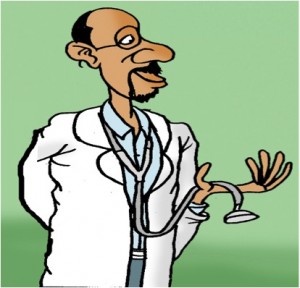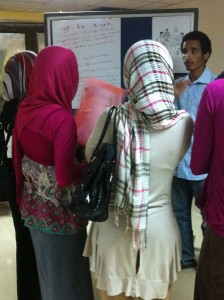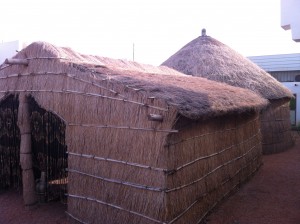Meet Anwar, a Sudanese doctor. Just one of 5 fictional characters created by delegates at the Knowledge Management for Health in Sudan event I spoke at, helped plan and run.
This exercise, Scenarios for the future, was set in 2020 and invited the 80 or so delegates drawn from across the whole of the health industry in Sudan to consider what a day in the life of each character might look like. This was a new and warmly embraced concept in an environment where my information is my soul and much of the debate about the future takes place against a backdrop of uncertainty and increasing austerity where:
- 2/3rds of all drugs are purchased ‘out of pocket’ not from health system
- drugs are proportionately more expensive than in other domains
- funds from external sources are available to assist with health informatics.
Having settled on a description of each character the delegates who were by this time in groups of 8-10 then set about imagining what their day might look like on January 1st 2020. A vivid imagination is required and was evident in the quality of the stories that were told by each group’s nominated storyteller.
I will in due course and with the organising committee’s permission publish the two ‘winning’ stories; yes we did do voting while the storytellers left the room.
One of Sudan’s leading pharmacists noted in a one:one conversation how important listening was and how difficult a technique this is for many to use when prescribing drugs.
By inviting each of the storytellers to play back the story to each of the other groups it was good to hear them say in the summing up that by the end they really felt they were the character.
The previous day I’d invited the delegates to change the way they looked and think about issues and barriers. Using when you change the way you look at things, the things you look at change exercise conducted in the best breakout rooms I’ve ever worked with, the delegates who are naturally loquacious soon grasped the concept of seeing the room through the lens of different professions.
This change of mindset was important: it allowed the subsequent round table (well round conference room) session that discussed:
‘What are the biggest issues we face in sharing knowledge and information about the health of our nation and how can we overcome them’
I’d invited each delegate to introduce themselves to three people they didn’t know. This worked well and encouraged a very frank discussion. The main issues highlighted were:
- no systematic collection of information and limited understanding of its value
- transparency of process (where do the figures go) and credibility of the data
- lack of human resources to do the collection
- limited statistical information to undertake scientific research on
- ownership of data and the whole process – fragmentation
- accountability to deliver
- communication/awareness of what each organisation is doing – lots of ‘stuff’ is happening but there is a real risk of duplication of effort e.g. many of the disease control programmes are creating their own informatized information systems
Delegates recognised the tremendous strides being made by the Public Health Institute (one of the event’s sponsors and host of the official dinner) in developing professional public health administration programmes, the creation of a Data Dictionary and the publication of the first Annual Health Performance Review though many bemoaned the lack of official support for research projects where Sudan has a prominent global position, Mycetoma Research Centre an example.
I came away from reflecting on a discussion I had around the event:
Its all about ‘informization’ – the ability to report from a health centre level with ‘point of sale’ data collected via PDA’s / mobiles as well as computers; about logistics management as a result to ensure supplies get to where they can do the most use.
This can be monitored by the minister, routine reports can be prepared showing which centre reported, which district has complete reporting, which state has complete and timely reporting and % of stock outs of basic drugs or vaccines etc.
And inspired by many of the presentations I’d seen on the morning of the second day from University of Khartoum’s research centre and of course the Public Health Institute who are reaching out to try and create greater awareness through public forum, newsletter and other events.
Perhaps the presentation that struck the biggest chord was from EpiLab
who have achieved impressive results in helping to reduce the incidence of TB and Asthma and whose research and community communication techniques are highly innovative. I loved the cartoons they developed on how to self treat and prevent the incidence of illnesses which were drawn up BY the local communities. Their pictures and their words are published as guides for the nation and I know they will make them available so I can share them in future blogs.
It was an honour, a challenge but nevertheless great fun enhanced by the warmth of the welcome and a genuine sense of appreciation. Sudan’s people are among the most engaging and intelligent I’ve met. One anecdote from a conversation with a young professional in the communications business illustrates their dilemma:
‘…of the 95 people who graduated in my year a few years back 90 are now working overseas, the majority in highly paid good positions…’
In my address I acknowledged the support I’d had from many people in preparing for the event. They were: Ahmed Mohammed, Dr Alim Khan, Dr Anshu Banerjee, Ana Neves, Andrew Curry, Archana Shah, Chris Collison, David Gurteen, Dr Gada Kadoda, Dr Ehsanullah Tarin, Dr Madelyn Blair, Sofia Layton, Steven Uggowitzer, Victoria Ward




Many thanks to you and hats off to your tremendous skill and tools for getting people to work together and to think differently, as well as the ease by which you fitted into our community. We will keep you posted on what transpires from these two brilliant two days.
I liked the workshop it was different and inspiring we worked together and produced new ideas and felt the power of togetherness.
A lot can be accomplished when differences are put aside and people work together?
I think it was an exciting workshop. It took me into a tour to talk to others, share with others and consolidate further that togetherness is a strong strength I was exposed to information research.
I personally liked the { “Coffee Huts” session } from one phrase said by a participant we managed to connect interact and the full description of the “ the hut as envisaged by a cleaner “ evolved and grew .
A simple exercise to describe the hut from the eyes of a” cleaner” created an effective portrait; produced how we as a group collectively envisioned the situation.
Thank you Paul, Gada and the KM team and interactive Forum.
When i first heard the title of this workshop, i was wondering what would it be about. tow days later, i came out with new ideas, new feild of knowledge and new friends. And that is me in the photo enjoying one of the stories dreamin about future with the effect of knowledge management.
Thank you Mr.Paul and all the organizers.
It was a pleasure meeting you all
Paul, a brilliant piece of work with great people. Well done. I wish we could do it in the NHS and stop the institutionalised Zombie behaviours that have killed so many unfortunate and vulnerable people.
Paul, your blog really brought home the challenges being faced over in Sudan. Your closing quote on the numbers of graduates working overseas is very close to home as my neighbour is a Sudanese doctor, now a consultant at a local hospital in Yorkshire. He is currently in Sudan as he goes back to work voluntarily for three weeks every year. It puts into perspective the challenges we face in the UK. Your work has clearly been very successful and productive and I very much enjoyed reading about it in your blog.
Dear Sofia many thanks. Your help before the trip was much appreciated. As you say perspective is everything. I am waiting for EpiLab to send me a copy of their presentation since the way they got communities to share knowledge on how to combat illnesses using cartoons was brilliant and worthy of sharing globally.